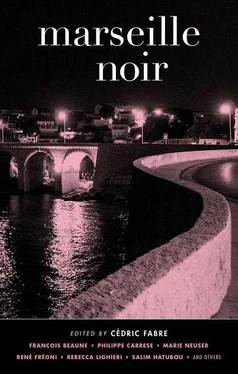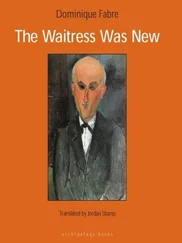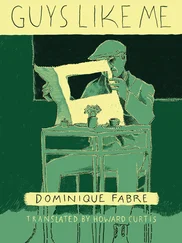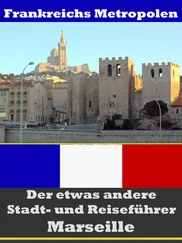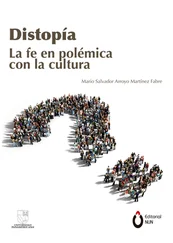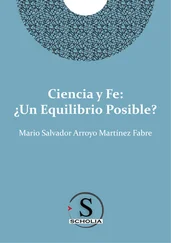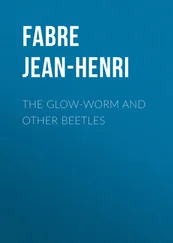Cédric Fabre - Marseille Noir
Здесь есть возможность читать онлайн «Cédric Fabre - Marseille Noir» весь текст электронной книги совершенно бесплатно (целиком полную версию без сокращений). В некоторых случаях можно слушать аудио, скачать через торрент в формате fb2 и присутствует краткое содержание. Год выпуска: 2015, Издательство: akashic books, Жанр: Крутой детектив, на английском языке. Описание произведения, (предисловие) а так же отзывы посетителей доступны на портале библиотеки ЛибКат.
- Название:Marseille Noir
- Автор:
- Издательство:akashic books
- Жанр:
- Год:2015
- ISBN:нет данных
- Рейтинг книги:5 / 5. Голосов: 1
-
Избранное:Добавить в избранное
- Отзывы:
-
Ваша оценка:
- 100
- 1
- 2
- 3
- 4
- 5
Marseille Noir: краткое содержание, описание и аннотация
Предлагаем к чтению аннотацию, описание, краткое содержание или предисловие (зависит от того, что написал сам автор книги «Marseille Noir»). Если вы не нашли необходимую информацию о книге — напишите в комментариях, мы постараемся отыскать её.
Marseille Noir — читать онлайн бесплатно полную книгу (весь текст) целиком
Ниже представлен текст книги, разбитый по страницам. Система сохранения места последней прочитанной страницы, позволяет с удобством читать онлайн бесплатно книгу «Marseille Noir», без необходимости каждый раз заново искать на чём Вы остановились. Поставьте закладку, и сможете в любой момент перейти на страницу, на которой закончили чтение.
Интервал:
Закладка:
Yes, but see, in 2001 I’m ten, doom is not in the picture yet, and besides, everything seems new and promising, gleaming under the June sun. The city hasn’t given in to the torpor of summer yet, I’ve put my roller skates on and I’m speeding down the slope that connects the plateau of the Palais Longchamp to its arc de triomphe and the columns that line either side of the cascade. I burst onto the terrace with no problem, lean my elbows over the balustrade in the same movement, and look for my sign, Aquarius, sculpted on the frieze decorating the colonnade. It’s a habit I’ve gotten into, among other childish rituals, to come here and run my fingers over the bas-relief: that muscular boy pouring water out of his vase with a huge splash always seemed a lucky sign, in this spot devoted to water, basins, and grottoes dripping artificial stalactites in the deafening noise of the cascade.
But today I’m out of luck: a girl’s leaning back against my column and staring at me with a mocking look.
What can I say? When you’re ten, how do you know you’ve just met the woman of your life, that she’ll be the one and not someone else and your whole life won’t be enough to know and love her — and in my case, that I’ll sentence her to death?
What can I say? She’s not even pretty the way I think of it at ten: a little plump, vaguely blond, with thick, heavy bangs that veil her blue eyes which don’t have any particular sparkle. She’s dressed the way I am: sweatpants and a T-shirt, black for me and pink for her, a color I hate because I’m a boy. Our resemblance stops at our dress, though: I have dark skin and dark hair, a curly mop on my head that still embarrasses me and I try to control with lots of gel. I have dark eyes that always look like I put on black eye shadow: they’ve given me my share of snide remarks and fights, because no way I’m going to let anybody call me a faggot without a fight.
What can I say? She’s not my type, and as a matter of fact I don’t care about girls, but on this fine June day, a shiver of pleasure goes through me, a very strong feeling, looking at her there and taking it as a sign that she’s hiding the Aquarius on the frieze from my sight. She starts talking to me with remarkable ease and a touch of disapproval.
“You’re lucky security didn’t see you. No roller skates allowed here.”
“I’m not scared of security.”
“What’s your name?”
“Salvatore, how about you?”
“Alice.”
“In wonderland.”
“You’re only the thousandth guy who’s said that.”
The conversation could have stopped right there, at that little but unbearable humiliation to my young male pride, but no, contrary to all expectation, we keep on talking, we even spend the afternoon together, running from one end of the park to the other. Alice regularly dashes back to reassure her mother, who’s reading on a bench while keeping an eye on her little brother, a fat baby named Quentin whose existence I instantly forget. I just tell myself — but it’s not the first time — that all families are not alike and there are parents who’re concerned about their children, afraid they might fall or run into the wrong people, while mine seem to have moved beyond parental concern long ago, just busy making ends meet and sleeping off their cheap wine or pastis.
What can I say? It continued. Alice became my friend, and wonderland was her, without my ever daring to tell her anything about my own wonder.
We would see each other in the park on Wednesday or Saturday afternoons for years. Together, we ran from the little kiosk selling drinks to the bandstand below; together, we beat countless bushes to flush out skinny cats, bums, or dazed junkies. If only I had known.
Together, we climbed over the balustrade separating the terrace from the monumental fountain and found ourselves wading in the stagnant water between the giant bulls that pull the chariot of the Durance, stamping impatiently with their hooves as if to make a triumphal entry into the city, then they’d run down boulevard Longchamp, take the Canebière, and end their cavalcade at the water’s edge.
The first time, I’m the one who guides Alice, gives her a hand, helps her climb up on the stony spine of one of the bulls as I’d occasionally been doing myself for a long time. Then we ride together, each on our mount, in the splashes that the wind brings back to us, in the glorious sun and toward a future that I still believe will be as radiant as that lovely day. With a satisfied look, Alice surveys the horned heads of our animals, the green water, the reeds, the moss.
“You’d think it was the Camargue.”
“You’ve been there before?”
“Sure, lots of times. You haven’t?”
I never go anywhere: my parents don’t have the time and my school, Leverrier, doesn’t go in for class trips. Too bad. I’ll catch up later on with Alice and our kids.
We keep growing. At eleven, we enter sixth grade in the same junior high, Chartreux, but we make sure never to be seen together. When I run into her, her smile, that marvelous smile as frank as it is contagious, becomes evasive and distant, while her look goes right through me, even if she vaguely waves to me every once in a while.
That doesn’t stop us from meeting from time to time, to explore the grottoes or the thickets, drink between the gilded caryatids of the Wallace fountain, or sit on the lawns next to the zoo where park security never comes after us with their strident whistles.
We keep growing, and growing up separates us. One day in January when strong winds are blowing through the city, I see her huddled up on the steps of the monumental staircase. I go down to join her and we sit next to each other for the last time in many years to come.
“What’re you doing here?”
“Waiting for my girlfriends.”
The wind tangles her hair, beats it down on her face and mine. She’s changed the way she does her hair, freeing her forehead from the childish bangs that had made such an impression on me four or five years before, but she still has her enviable cheeks, and the mistral is bringing out their delicate pink. With a politeness that makes my heart sink, she asks about school: “What’re you going to do after eighth grade?”
“Dunno. Maybe vocational school, become an electrician. I think. You?”
“Well. high school.”
A new gust of wind brings us together and I breathe in, desperately, her dizzying girl smell, all freshness and lavender. From the pocket of her pretty navy-blue peacoat, a thousand miles from the loud down jackets my parents sell, she pulls out a playing card.
“Look, this just flew into my face. The wind brought it.”
“What is it?”
“A tarot card. I’ll give it to you.”
Then she sees her friends and charges down the steps to meet them. All I can do is watch her gloomily as she leaves the palace and my life. If I had an ounce of sense, I’d double back to traverse de l’Observatoire and ask Esmée Villalonga to interpret that card Alice and the wind have drawn for me. But I do not. The card shows a crenelated tower with flames coming out of it. It also seems to suggest a fall, but how could I see my own fall coming when I’m only fifteen with plenty of rage in my heart—la rabbia, not to mention the rest: arrogance, confidence, and the urge to fight and make it?
I’m sixteen, then seventeen, eighteen, twenty. I didn’t last long in school: I stopped as soon as I could, left my parents and the three-room apartment on traverse de l’Observatoire for a studio at the other side of the park, on rue Lacépède. I get by, doing odd jobs here and there, and mostly I do a lot of dealing: grass, coke, MDMA, a little of everything in fact. I adapt to the market, to the needs of my customers. I choose them carefully so I don’t have to cope with real druggies — they disgust me and they’re an endless pain in the ass.
Читать дальшеИнтервал:
Закладка:
Похожие книги на «Marseille Noir»
Представляем Вашему вниманию похожие книги на «Marseille Noir» списком для выбора. Мы отобрали схожую по названию и смыслу литературу в надежде предоставить читателям больше вариантов отыскать новые, интересные, ещё непрочитанные произведения.
Обсуждение, отзывы о книге «Marseille Noir» и просто собственные мнения читателей. Оставьте ваши комментарии, напишите, что Вы думаете о произведении, его смысле или главных героях. Укажите что конкретно понравилось, а что нет, и почему Вы так считаете.
